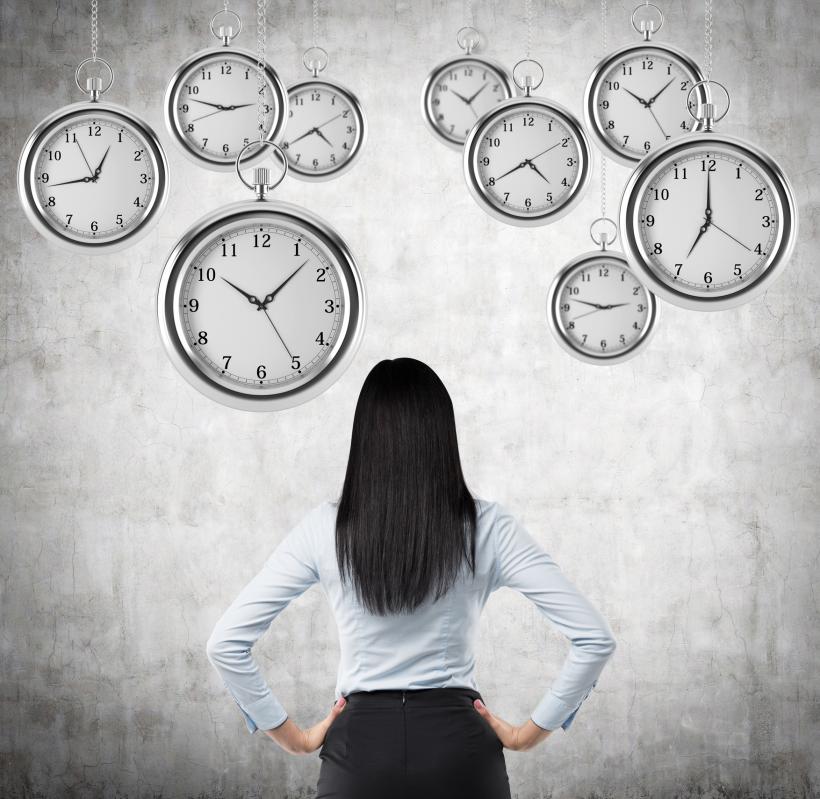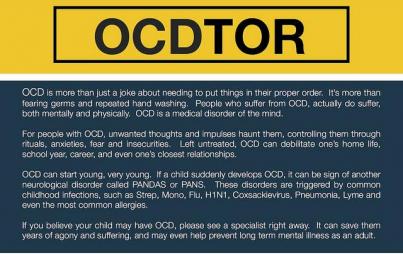
Time runs life for everyone, but it's a different struggle with OCD.
I have OCD and I focus incessantly on time as a proxy for order and control.
Tick Tock. Tick Tock.
For example, the process of getting ready for work in the morning starts about an hour before I go to bed the night before. It starts with a decision about what time to set the coffee maker. Usually, the coffee maker starts at 6:15 a.m., and so based on that, I decide when to set my alarm for the next morning. I have to be up by 6:15 a.m. no matter what, to make sure the coffee is brewing. Coffee is not optional. On the days I go to the gym before work, everything is advanced one hour.
As I’m falling asleep, I vacillate between changing my alarm time — five minutes later, five minutes earlier — and double checking the alarm is on. I wonder about if I’ll have enough time to get ready, and I also want to sleep for as long as possible. This indecisiveness makes me anxious because it literally cuts into my sleeping time. As the minutes converge to the magic number between 8 hours of sleep and 7:59 hours, I get more upset. I like to get exactly 8 hours of sleep on a weeknight.
So, I push the alarm clock back a minute and again double check that it’s correctly set. This cycle could go on for a while until I remind myself that I have to be up by 6:15 a.m., no matter what.
I leave the office at 3:30 p.m. — supposedly. When I leave the office is entirely correlated with the bus schedule. Around 3:00 p.m., my live tracking starts. I’m tracking two buses at this time of day, and so the dance of backward and forward math commences.
From the moment I go to sleep, and resuming immediately again the moment I wake up, I’m calculating the minutes. I am always aware of the time.
Tick Tock. Tick Tock.
Zoom in to my untamed mind.
It’s 6:45 a.m. on a Monday morning. I’ve been in the kitchen since 6:42 a.m. preparing my coffee and food for the day. I start thinking about this kitchen situation at 6:25 a.m. 6:25 a.m. is a critical decision point. It’s the time I decide if I have enough time to put on make-up. This decision is contingent on how long I took to shower, if I showered, if I straightened my hair, etc., but more importantly, it’s 15 minutes before I need to be in the kitchen, so it’s a turning point.
Now, it’s 6:51 a.m.
I’m right in the middle of my clock-checking hell. The latest I can leave to catch the bus is 6:52 a.m. At 6:50 a.m. every day, I start checking the bus schedule, my clock, my phone, the oven, the coffee maker, and the microwave for when they all unite on 6:51 a.m., so I know when to put on my coat and headphones. I need to be outside and locking the door at 6:52 a.m. My science is precise; once I left at 6:53 a.m. and I missed the bus. Once I left at 6:50 a.m., and then I was too early — wasting time waiting for the bus is a big annoyance to me.
Tick Tock. Tick Tock.
So, I leave every day at 6:52 a.m., and I walk, typically way too fast, to make sure I catch the bus — since I left just enough time. And when the bus is running late, I'm doing math again, naturally. If the bus comes at 7:03 a.m., it arrives at the stop by work at 7:27 a.m., which means that if it's a seven-minute walk from the bus stop to my office, I'll arrive at 7:34 a.m. Which is four minutes late.
At some point, I remind myself the bus schedule is out of my control, and I left on time. I try to settle my anxiety by reminding myself what is within and outside of my control. This works for a while. And once I finally get to work I can occupy my mind for the better part of the day knowing there’s a schedule and common practice around timeliness.
Around 3:00 p.m., my mind starts to fuss again.
Tick Tock. Tick Tock.
I leave the office at 3:30 p.m. — supposedly. When I leave the office is entirely correlated with the bus schedule. Around 3:00 p.m., my live tracking starts. I’m tracking two buses at this time of day, and so the dance of backward and forward math commences.
If the bus comes at 3:39 p.m., I need to leave at 3:29 p.m., and if the tracker says it’s coming in twenty-three minutes, I need to leave thirteen minutes from that time. Then, I refresh the page. And start all over again. The clock-checking game — watch, computer, phone, watch, computer, phone — becomes an insatiable compulsion. I go on and on in a loop.
By this point, I’m getting nothing done at work except stirring up anxiety and frustration. Finally, it is the magic minute where the bus arrival time and the approximate walking time collide — regardless of what time it is, I hastily leave.
Tick Tock. Tick Tock.
My day, and my calculations, persist right up until I’m deliberating about what time I need to go to sleep, based on what time I need to be up the next morning. I fall asleep cycling through how I spent the day’s hours and what tomorrow’s schedule will bring.
If you’re exhausted reading this, I get it! This is exhausting for me too, but also it feels necessary.
At its core, my OCD is all about control. Perhaps it’s because I can recall so many times when I didn’t get to be in control of my life. I always fight my environment and circumstances to feel in control of what’s happening around me; it’s comforting, reliable, and trustworthy.
Except it's not really. It’s actually deceptive and draining. Control is a made-up, abstract concept. It reveals its malicious self when I’m not looking. When I feel like everything is finally manageable, the perception of control laughs in my face and shows me how wrong I actually am (e.g., leaving perfectly on time yet missing the bus because it was a minute early).
Control is a falsity. It’s a mirage. But since I’m compulsive, I’m literally trapped in a vicious cycle of catching and chasing control.
Sometimes, I wonder if I’m trying to control time or if time controls me. Yet I relentlessly focus on time because it’s a concrete (ahem, abstract, made-up) concept that helps make overwhelming things feel more manageable. Time is something that we (mostly) all operate by. I focus on time because it is reliable and conventional enough that I can expect the people around me to be cooperative.
It fulfills my need for order and predictability. Craving control isn’t glamorous. But any threat to that pursuit poses a likelihood for a compulsion to kick in — a false sense of manufactured control.
If you think this sounds crazy... Well, it probably is.
Tick Tock. Tick Tock.







